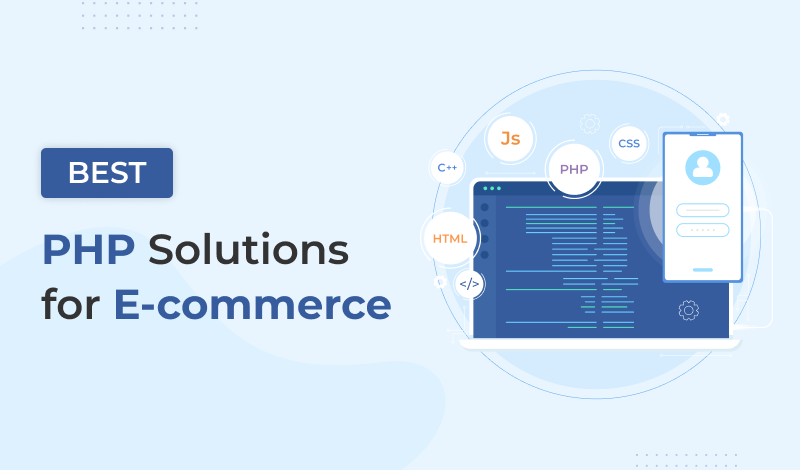In this article, we’ll cover the 5 best PHP e-commerce solutions. One of the most attractive ways to enter the digital age is to start your own online business, more precisely, an online store. Online sales i.e. e-commerce business, globally, reached $1.6 trillion in 2015, and that was a staggering figure at the time. What then to say about last year’s figure of $4.9 trillion. By 2025, an even greater trading volume is expected: about $7.4 trillion. The era of online commerce has sunk its claws deep into the world market. Many companies and stores are now online. From physical to digital products, everything is now on the market and sold online.
What’s obvious, as e-commerce has experienced a boom in the market, the demand for software that would support online sales on all popular platforms has also increased. Moreover, trends in e-commerce are leading to a new approach to new customers that implies new and creative ways to achieve better sales. Numerous e-commerce software has appeared on the market and new, creative methods are being offered to sell products to the end customer.
WooCommerce
WooCommerce is a WordPress plugin that does a great job as it covers as much as 30% of the market. We can also call it the initial level of e-commerce software solutions because it’s easy to use and anyone can master it quickly. It also gives complete control over the online store, both to the owners and the development team that deals with its implementation and maintenance.
Pros:
- You can divide the products into categories and assign them sales prices. WooCommerce stores can offer physical and virtual products.
- There are over 2,000 different themes on the WordPress platform that allows users to change preset CSS styles and colors.
- WooCommerce has a number of tools to help control details, track orders, and engage the customer. Users can view open orders, add new delivery status information, assign discount codes, and more.
Cons:
- WooCommerce isn’t a complete e-commerce solutions. Those involved in its implementation must install multiple extensions to complete all functionalities.
- It’s not suitable for handling complex and large e-commerce stores.
- The basic plugin isn’t enough for a fully installed store.
Shopify
Shopify is a full-featured e-commerce platform that allows you to build, grow, and manage a company on the Internet. Anyone may set up an online store and sell their products using subscription-based software. Shopify merchants may use Shopify POS, its point-of-sale app, and hardware to sell in physical locations. Shopify is ranked second for the distribution of websites that launched e-commerce technologies, having a market share of 18%.
Pros:
- One of the most frequently expressed compliments about this platform is how simple it is to use.
- It’s ideal for incredibly large and complex online stores with tens of thousands of different products.
- Shopify has a customer service team that is dedicated to helping customers.
- Fully hosted platform with a variety of themes, customizability, and marketing ease, especially if you include email for your e-commerce website. At this level, incorporating an email strategy can assist you in nurturing leads and engaging current consumers. You may spend more time producing highly tailored and targeted messages because you’ll spend less time combing through data and transporting user data obtained by Benchmark to your email database.
Cons:
- The platform plans’ pricing component.
- Issues that have to do with customization.
- Basic plans provide fewer content marketing options, reporting, and analytics.
- The rigidity of the exit strategy.
Magento
Magento is another e-commerce solutions that provides customers with a customizable system and control over content, functionality, and graphics for their online stores via a software libre set-up. It ranks third with 9% of the total market share. Of course, we can say that this is an advanced solution for an online store. It also provides powerful SEO and directory management tools.
Pros:
- Magento can be used for large e-shops and projects with thousands of products.
- A large number of extensions that allow users to easily adapt the e-shop to specific needs.
- Fully customizable and allows for the creation of completely unique stores.
Cons:
- If you aren’t a developer, opening a store like this can cost you a lot.
- As with other open-source projects, you have no technical support other than that on the forum.
- Magento is bulky and slow to load, and templates can be difficult to integrate.
PrestaShop
PrestaShop is an open-source e-commerce solutions written in PHP programming language with MySQL support. It’s globally in fifth place with more than 5% market share. This platform gives flexibility to businesses and doesn’t require specific knowledge to open an online store.
Pros:
- PrestaShop is simple to install and configure basic features, but if your hosting provider allows one-click installation, everything will be considerably easier, even for users who aren’t on a first-name basis with tech.
- All the necessary information is available on the control panel, making the user interface straightforward.
- With more than 5,000 add-ons and extensions, PrestaShop integrates some impressive features such as automated email tracking, SEO, and site management.
- Easily customize your e-shop to your needs.
Cons:
- Some of the fully functional modules aren’t cheap. You’ll need additional funds to upgrade and expand PrestaShop, modules, extension themes, and technical support.
- PrestaShop can’t handle large and complex sales systems.
- Users occasionally have difficulty managing the site, PrestaShop documentation is limited, and help can only be found on forums. Plus, PrestaShop doesn’t have live chat support but offers the option of paid technical support, which requires additional user costs.
OpenCart
OpenCart is the last option in this review of e-commerce solutions. It’s a simple e-commerce tool that manages simple and medium-sized stores. It has caught our attention because it currently covers just over 7% of the total market share of e-commerce tools.
Pros:
- OpenCart is a lightweight tool that’s very easy to download and install.
- It doesn’t take much technical knowledge because the user panel is simple and intuitive.
- There’s ample documentation online and they provide free support as well as software updates.
Cons:
- Don’t expect top performance from OpenCart unless you install additional optional tools, such as SEO.
- A store set up via OpenCart isn’t very easy for detailed settings and can be inconvenient for some specific businesses.
- For caching itself, you can’t rely on OpenCart, so you need to install an extension for optimal performance.
Conclusion:
The list above is full of facts that are for or against individual solutions and each of them does a good job for different user groups, depending on the requirements. It all depends on the needs you need or the desire to adapt them to the customer as much as possible. The choice also depends on your requirements, the current size of the store, as well as its future and the goals you have set for it.
This fast overview of e-commerce solutions should assist you in determining the best option for your company and making the selection that best matches your needs. Of course, don’t think about these tools if you haven’t previously made the best choice in choosing a reliable hosting solution.
Why do you need to pay attention to choosing a hosting provider and the package that best meets your needs? Because the online store is a serious business and doesn’t suffer from limited disk space, as well as speeds that would be a problem at work and drive the customer from your site. Also, technical support, which is always available to respond to problems as soon as possible, is mandatory regardless of which of the above software solutions you choose.




Leave a Reply